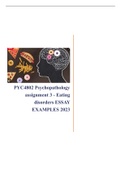Essay
PYC4802 Psychopathology assignment 3 - eating disorders - ESSAY EXAMPLES
- Course
- PYC4802 - Psychopathology
- Institution
- University Of South Africa (Unisa)
the essay likely provides a comprehensive overview of eating disorders from a psychopathology perspective, drawing on both empirical research and theoretical models to provide a nuanced understanding of these complex conditions.
[Show more]




